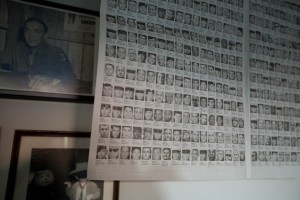
The yahrzeit for my Father, Lenny, is 25 Sivan, which in this year corresponds to the sundown before, through the evening of, Monday, June 7, 2010. I find the Jewish calendar comforting in this regard since, were we to observe the Roman calendar date, the actual date on which he died, June 16, 1963, Father’s Day, I would always be saying Kaddish and lighting a candle for him on a made-up day designed to have you remember your father. A little too contrived for me, since my relationship with him didn’t last so long and most of it was too painful to be worthy of celebrations endemic to Father’s Day.
When he died, I was a year short of my sixteenth birthday, a milestone of significance only because it allowed me to obtain a learner’s permit. His sickness carried on for most of my memorable childhood. We started taking him to the hospital and to the doctor’s offices when I was six or seven. I can remember the operations to remove little cysts from his arms, neck, and head. I remember the coughing, the wheezing, the fatigue. He couldn’t throw a ball anymore, walk, carry things, or bend over. At ten, we found out he had some kind of blood disorder and something growing in his lungs. He fought on for all those years, missing work, getting treatments. I helped put salve on the wounds left by the primitive radiation treatments of the time. No surprise when he died; subject to the remissions, he had a dead-going-through-the-motions-look for years. No one thought I knew.How did this happen to him, not to mention me. My Mother had an explanation. Lenny needed to go into the Army and fight for his country during WWII. He had married her in 1937. Hank, my brother who is now dead too, was born in 1940. Lenny worked for a Wall Street law firm, Lamke and Stein, commuting everyday from Stamford, CT, my Mother’s hometown, where he had moved from Brooklyn after his marriage. Active in the Jewish community and a caring and devoted family man, so I am told, he felt it was his obligation as a citizen and a Jew to join the war effort. He had volunteered in the Harbor Patrol, a local effort aimed at spotting enemy submarines in Long Island Sound. But, he and a few of his local pals from the J, wanted to do more. In 1943, they enlisted.
I don’t know a lot of what happened during his time in the Army. He went to New Guinea, rose to the rank of Major, and returned in 1945 or 1946. Earned a Bronze Star, for what I dunno. People said he had changed. Most of his rear teeth had fallen out. His hair line had receded. He had some kind of scuzzies on his skin. And his personality became erratic—fits of anger, depression, moody. My Mother contended to his death that he had contacted something fighting in the jungle. No way to know now, memories have a way of being distorted by other memories and the stories of others whose biases were not all that clear. But, I always consider him to have been a war casualty, one of the unseen who don’t die on the field of battle but die because of it.
I came along in July 1947. My brother never had much use for me. He had his own growing pains which didn’t include a wimpy kid, seven years his junior who became part of his responsibility. He had some difficulty growing up and split from the family during High School and College. Lenny died days after his graduation from Franklin and Marshall. I stayed home caring for him while the relatives went to the ceremony. My Mother had her own agenda, in addition to trying to be Harriet to Lenny’s Ozzie (they had met when he played in a roadside band at Ann Arbor during college). She spent a lot of time with her sisters, did volunteer work, and played tennis. Not that I was ever neglected, but I wasn’t high on her list of people she liked to spend time with. Lenny and I did spend time together, going places, doing things. Nothing that passed was too insignificant to be a teaching opportunity for him and me.
Those who knew him say I looked like him, thought like him, and acted like him, which for many, except for the looks, was not always a compliment. People said I was his favorite, that he felt distanced from his wife and eldest son when he returned from the war. Who knows? No counselling in those days; he probably would not have gone anyway. Proud man. Handsome man.
He was all I had in the way of family who loved me. The death left me wounded in so many ways, not all of which have healed. He died too soon for me to find out what kind of a man he was or for him to find out what kind of a man I am.
Thank you for sharing these words. Our sages say, words from the heart go right to the heart. Your words go to my heart.
Joshua